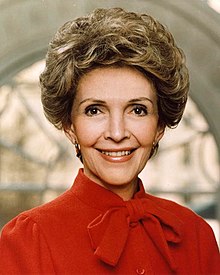
Back Nancy Reagan Afrikaans نانسي ريغان Arabic نانسى ريجان (محاميه) ARZ Nancy Reagan AST Nensi Reyqan Azerbaijani نانسی ریقان AZB Нэнсі Рэйган Byelorussian Нэнсі Рэйган BE-X-OLD Нанси Рейгън Bulgarian ন্যান্সি রিগ্যান Bengali/Bangla
Nancy Reagan | |
|---|---|
 Official portrait, 1983 | |
| First Lady of the United States | |
| In role January 20, 1981 – January 20, 1989 | |
| President | Ronald Reagan |
| Preceded by | Rosalynn Carter |
| Succeeded by | Barbara Bush |
| First Lady of California | |
| In role January 2, 1967 – January 6, 1975 | |
| Governor | Ronald Reagan |
| Preceded by | Bernice Brown |
| Succeeded by | Gloria Deukmejian (1983) |
| Personal details | |
| Born | Anne Frances Robbins July 6, 1921 New York City, U.S. |
| Died | March 6, 2016 (aged 94) Los Angeles, California, U.S. |
| Resting place | Ronald Reagan Presidential Library and Museum |
| Political party | Republican |
| Spouse | |
| Children | |
| Parent |
|
| Education | Smith College (BA) |
| Signature | |
Nancy Reagan (/ˈreɪɡən/; born Anne Frances Robbins; July 6, 1921 – March 6, 2016) was an American film actress who was the first lady of the United States from 1981 to 1989, as the second wife of President Ronald Reagan, the 40th president of the United States.
Reagan was born in New York City. After her parents separated, she lived in Maryland with an aunt and uncle for six years. When her mother remarried in 1929, she moved to Chicago and later was adopted by her mother's second husband. As Nancy Davis, she was a Hollywood actress in the 1940s and 1950s, starring in films such as The Next Voice You Hear..., Night into Morning, and Donovan's Brain. In 1952, she married Ronald Reagan, who was then president of the Screen Actors Guild. He had two children from his previous marriage to Jane Wyman[1] and he and Nancy had two children together. Nancy Reagan was the first lady of California when her husband was governor from 1967 to 1975, and she began to work with the Foster Grandparents Program.
Reagan became First Lady of the United States in January 1981, following her husband's victory in the 1980 presidential election. Early in his first term, she was criticized largely due to her decisions both to replace the White House china, which had been paid for by private donations, and to accept free clothing from fashion designers. She championed opposition to recreational drug use when she founded the "Just Say No" drug awareness campaign, considered her major initiative as First Lady, although it received substantial criticism for stigmatising poor communities affected by the crack epidemic. More discussion of her role ensued following a 1988 revelation that she had consulted an astrologer to assist in planning the president's schedule after the attempted assassination of her husband in 1981. She generally had a strong influence on her husband and played a role in a few of his personnel and diplomatic decisions.
The couple returned to their home in Bel Air, Los Angeles, California, after Reagan's time in office. Nancy devoted most of her time to caring for her husband, who was diagnosed with Alzheimer's disease in 1994, until his death at the age of 93 on June 5, 2004. Reagan remained active within the Reagan Library and in politics, particularly in support of embryonic stem cell research, until her death from congestive heart failure at age 94 in 2016. Although her tenure as First Lady was somewhat poorly received, she gained high approval ratings in later life for her devotion to her husband in his final illness.